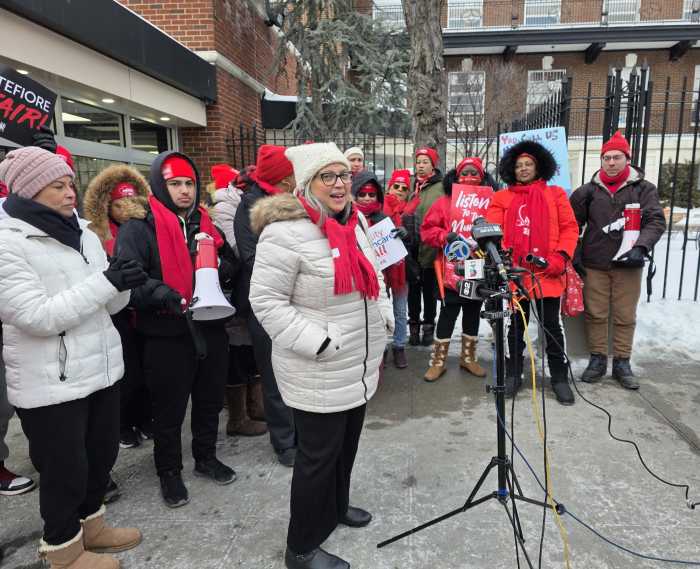Federal judge resolves two-year lawsuit in Florida.
By: ARTHUR S. LEONARD | US District Judge K. Michael Moore has ordered the School Board of Okeechobee County, Florida, to allow a Gay-Straight Alliance to meet at the high school there on the same basis that other non-curricular groups enjoy.
In a July 29 ruling, Moore found that allowing the student group to meet at the school would not necessarily contradict or undermine the school's sex education curriculum, which stresses abstinence outside of heterosexual marriage, and that the school board's official policy banning any club based on “any kind of sexual grouping, orientation, or activity of any kind” violates federal law.
Perhaps most significantly, Moore noted that the school board has an obligation for the welfare of gay students, not just the majority of students.
Students at the school tried to form the Gay-Straight Alliance during the Fall 2006 term, but were rebuffed by the administration, even after the students specifically pointed to the Equal Access Act, a federal law that students nationwide have used to win nearly every lawsuit seeking recognition for a Gay-Straight Alliance. Represented by the American Civil Liberties Union of Florida, the students sued and won a temporary injunction against the school board.
But, as in similar cases, as litigation dragged on, students graduated, and winning a successful final conclusion became problematic. At one point, the federal judge determined there were no actual plaintiffs left, and the case was on the verge of dismissal, but new student plaintiffs were found last spring. At that time, despite the prior injunction, Okeechobee officials again rejected students' attempt to form a GSA.
Judge Moore totally rejected the school board's argument that recognizing a GSA would violate the school's obligation under state curricular standards and federal law governing the use of funding grants, which are both based in the head-in-the-sand, right-wing Christian approach toward sex education for high schoolers. Those standards focus on abstinence, lecturing students about refraining from any non-marital sex, and avoiding classroom discussion of contraception or abortion.
Okeechobee officials argued that allowing a GSA would undermine this curricular mandate, but Moore was not convinced. He quickly dispensed with the absurd argument that the school could lose federal funding, pointing out that more than 700 US high schools have such student organizations, and there is no evidence that any has lost federal funding as a result.
In fact, Moore noted, the Supreme Court has recognized a clear distinction between curricular and non-curricula activities in various contexts, including cases in which schools argued that they should not be required to allow certain student groups because that could be misconstrued as endorsement of their agendas.
“If secondary school students are considered sophisticated enough to distinguish between student speech permitted on a nondiscriminatory basis and official acts of the school,” wrote Moore, “it follows that Congress, in its provision of federal funds to the states, is capable of drawing the distinction as well, as are Florida's courts.”
Moore also found no inconsistency between the GSA's mission to promote tolerance for gay people and the school's abstinence-only health education program, rejecting the idea that “the dialogue required to discuss tolerance towards non-heterosexuals is impossible to convey without doing violence to the principle of abstinence.” Moore argued that if this were true, then any discussion of sexual issues in the curriculum could be seen as undermining the abstinence policy.”
Moore, in fact, pointed out that the abstinence program, when applied to gay people, “loses the core of its health and safety and child welfare component because a marriage-dependent abstinence-only message” is of little value to gay students since Florida does not allow same-sex marriage. Neither its efforts to prevent sexually-transmitted diseases nor its “teaching that 'a mutually faithful monogamous relationship in the context of marriage is the expected standard of human sexual activity'” is relevant to gay students, he wrote.
Under the Equal Access Act, Moore wrote, the only way Okeechobee County could exclude a GSA would be to exclude all non-curricular student groups; it cannot pick and choose based on the subject matter of the group, unless there is a legitimate justification based on the well-being of the students, which he could not find. Moore emphasized that the well-being of non-heterosexual students was also relevant, and denying them a GSA was not in their best interest.
Moore also found support for his conclusions in the First Amendment and the body of cases dating back to the Vietnam War era holding that high school students have a right to engage in non-disruptive political speech at school. “The GSA's tolerance-based message would not materially or substantially interfere with discipline in the operation of the school,” he wrote, so the School Board's desire to avoid the “discomfort and unpleasantness of tolerating a minority of students whose sexual identity is distinct from the majority of students and discordant to [the] abstinence-only program” was not a legitimate justification to ban the GSA.
Moore awarded token damages of $1 to the plaintiffs, since they presented no evidence of monetary damages, but they can pursue compensation for their litigation expenses.


































